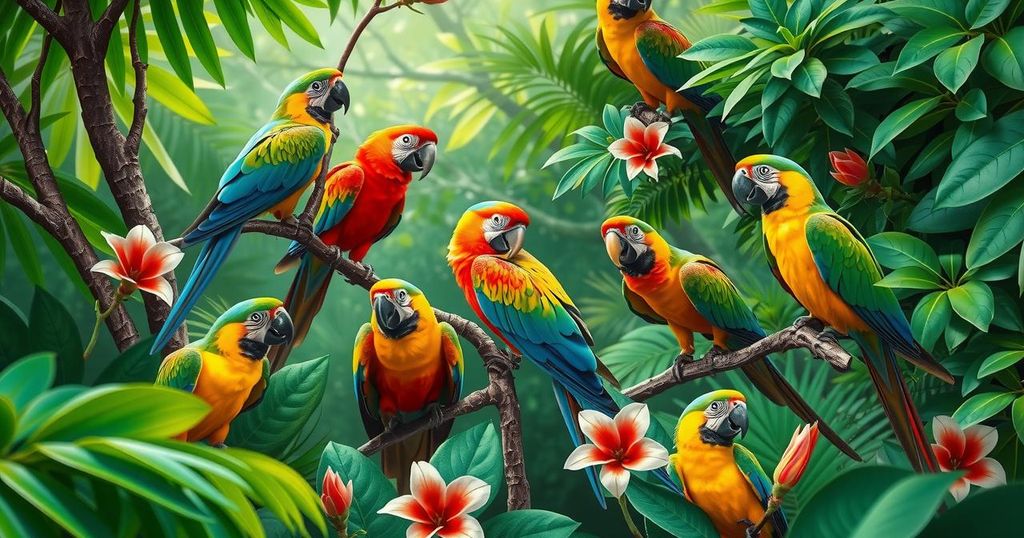Group Seeks Stronger Protection of Parrots in Nigeria

Wild Africa and the World Parrot Trust are calling for stronger protections for parrots in Nigeria amid ongoing illegal trade. Recent interceptions by wildlife officials highlight the urgency, with statistics showing alarming rates of capture mortality. The groups advocate for swift legislative action and greater public awareness to protect these crucial species.
As the global community observes World Parrot Day, a coalition of wildlife advocates is pushing for stricter protections for parrots in Nigeria. The Wild Africa organization and the World Parrot Trust have raised alarms about the ongoing illegal trade of various parrot species in a recent statement. Released on Saturday, the announcement emphasizes the critical role parrots play in preserving ecosystems, particularly through seed dispersal that aids in forest regeneration.
The plight of parrots, especially the once-abundant African Grey, is dire. With decades of trapping and trafficking contributing to their rapid decline, the statement sheds light on troubling statistics; over 1.2 million wild-caught grey parrots have entered international trade over the last 40 years, and a shocking 40 to 60 percent of them do not survive the capture and transport process. Estimates of the total number of grey parrots caught may be as high as three million, highlighting the urgent need for intervention.
Despite Nigeria’s existing laws designed to protect these birds, the enforcement has been notably weak, allowing the illegal pet trade to flourish. However, there have been some recent successes in curbing this unlawful practice. Notably, the Nigeria Customs Service (NCS) recently intercepted over 300 parrot heads in March 2025, drawing attention to the brutality of this trade. In another instance earlier in May, three suspected wildlife traffickers were apprehended by National Environmental Standards and Regulations Enforcement Agency (NESREA) officials in Abuja, who discovered live African grey parrots among their possessions.
In April, efforts to combat this issue continued as Special Wildlife Officers seized 12 live grey parrots being smuggled on a bus between Kaduna and Lagos. These parrots are currently being rehabilitated at Pandrillus Nigeria Drill Ranch, reflecting a proactive approach to wildlife conservation amidst the challenges.
Dr. Mark Ofua, a representative from Wild Africa, stressed the importance of parrots as keystone species, stating, “Parrots are more than just brilliant colors and clever mimicry—they are vital ambassadors of our planet’s wild places.” He urged action on World Parrot Day, emphasizing the need to preserve the forests they inhabit and ensure that their voices do not fade away.
Echoing these sentiments, Mr. Ifeanyi Ezenwa, the World Parrot Trust’s Nigeria Country Coordinator, underscored the grim reality faced by the grey parrot population. He pointed out that while there seems to be a stronger effort from NESREA, NCS, and NPS to halt illegal trade, many remain unaware of how exploiting these birds harms Nigeria’s natural heritage.
The announcement underlines Nigeria’s efforts to combat this crisis, including the introduction of the Endangered Species Conservation and Protection Bill, which the advocates urge be passed quickly to bolster law enforcement. Furthermore, they stress the need for educational initiatives to reduce the appetite for parrots as pets.
In conclusion, both Wild Africa and the World Parrot Trust are committed to fighting for stronger conservation policies. They plan to use various media outlets—like radio, TV, billboards, and newspapers—to spread awareness about the need for action. They invite governments, businesses, and individuals to unite in the cause, stressing that timely action is indispensable for the protection of parrots in Nigeria.
The coalition of Wild Africa and the World Parrot Trust is striving for stronger protections for parrots in Nigeria, especially as the illegal trade continues to threaten their existence. While some positive strides have been made in law enforcement, significant challenges remain, particularly in education and awareness. The groups are advocating for legislative measures, like the Endangered Species Conservation and Protection Bill, and ongoing public education campaigns to safeguard parrot populations and their habitats. Without immediate action, these iconic birds risk disappearing from Nigeria’s wildlife landscape.
Original Source: nannews.ng







